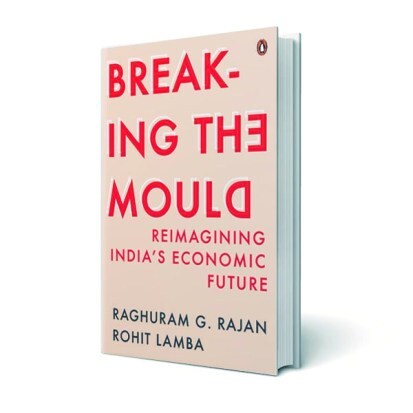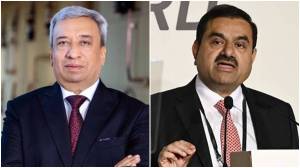Breaking the Mould: Reimagining India’s Economic Future
Raghuram Rajan, Rohit Lamba
Penguin Random House
Pp 336, Rs 799
Exclusive excerpts of Breaking the Mould: Reimagining India’s Economic Future by Raghuram Rajan, Rohit Lamba
Direct Transfers and the Promise of Technology
While subsidies distort the decisions consumers and producers make, direct transfers of cash that are not tied to production or consumption decisions do not. Both state and Central governments have shown that they can deposit cash directly in the bank accounts of citizens. Most of the poor have bank accounts, thanks to the government’s Jan Dhan scheme, intended to open bank accounts for all. The Aadhaar unique identification number for every adult citizen of the country prevents duplicate transfers or transfers to non-existent persons. The combination makes it easy to make transfers to almost every citizen. We say ‘almost’ because a small fraction of people, unfortunately the neediest, are still not covered by either bank accounts or Aadhaar.
Be that as it may, once we want to separate rich from poor, and make transfers only to the latter, we run into the problem of inadequate information. The government does not know precisely who is rich. It could base transfers on tax records, but not only would that further dis-incentivize reporting incomes to tax authorities, it would also reward those who are good at hiding their income. The government could exclude those who own a car, property or land, but ownership title may be distributed across children or held in a corporation. It could exclude those who use a lot of electric power, but that would encourage power theft.
Nevertheless, cash transfers to the poor beat distortionary subsidies. Also, money in the hands of the poor is empowering—if they use it to pay a private school’s fees, they feel they have a right to get good value for money, as one founder of private schools told us. Consequently, the paying poor will protest if they get rotten service, which helps improve the quality of education (or health care).

It may also encourage investment. As Raghu’s student Nishant Vats has pointed out, farmers who get the guaranteed annual transfer of Rs 6000 from the Pradhan Mantri Kisan Samman Nidhi tend to borrow to invest, perhaps conscious that they now have a guaranteed inflow that will prevent destitution. As a result, they increase their incomes by significantly more than the guaranteed Rs 6000 per year.
The logical conclusion from all this would be to replace subsidies with cash transfers, but this is usually politically very difficult. What we can certainly do is to stop any more subsidies, move any incremental supports, especially to the poor, to cash transfers, and try and sweep all forms of cash transfers, at least from the Central government to start with, into one family transfer where appropriate.
For example, assuming India wants to give Rs 8000 to every household every year (the Rs 6000 to farmer households augmented by inflation), and assuming the average household has two adults and two children, it could transfer Rs 2000 into every person’s bank account. Economists Maitreesh Ghatak and Karthik Muralidharan suggest keeping the overall transfer at 1 per cent of the GDP, which is what this transfer would amount to. For very poor households, this would be a substantial direct benefit, but it could also be the basis of borrowing and asset creation. The transfers are small but could help put more varieties of food on the table than grain, or put a child in school, or offer the equity against which to borrow to invest. Eventually, as the economy grows, the number could be scaled up.
To make the scheme more targeted, we could follow exclusion criteria, recognizing the difficulties pointed out earlier and hoping that the malfeasance engendered by the small size of the transfer is small: the government could taper transfer payments off to income tax payers as their incomes exceed, say, Rs 2.5 lakh a year; exclude government servants and employees of large firms; taper transfers to those whose land ownership, past vehicle or house purchases, or power consumption exceeds a certain amount, and so on. Some countries have experimented with making lists of beneficiaries public, so that those who clearly meet the exclusion criteria have an added incentive to declare themselves ineligible. The money saved by not sending benefits to the excluded could be added to the pool going to beneficiaries. Further, since some states are already making such transfers, the Centre could coordinate with states to ensure the cumulative transfer serves the purpose.
There is a fear that people may spend the transfers irresponsibly, say, men drinking them away. Yet there is little evidence across countries that cash transfers are spent on ‘temptation goods’ such as alcohol and tobacco. Instead, studies suggest that cash transfers are typically spent on increasing expenditures on food, including for increasing the diversity of the food purchased, on health care, on livestock and agricultural inputs, and on savings. These expenditures are certainly consistent with what we think India needs.
Conditional Support
Much of what we have discussed so far is unconditional support for the distressed and the poor, a helping hand to let them build assets or their human capital. India also has a National Rural Employment Guarantee Scheme, which offers distressed farmers and agricultural workers hundred days of remunerated work every year. Given the work is physical and hard, and the remuneration modest, it is unlikely that anyone but the needy will take it up. So it is a useful conditional safety net, used extensively during Covid, when urban migrants returned home to their villages.
Given the plight of urban migrants, marooned in cities without work during the Covid shutdowns, or forced to trudge hundreds of miles home to their villages, it is important that we think of an urban safety net along the lines of the rural scheme. A National Urban Employment Guarantee, structured so that it does not encourage or discourage rural–urban migration, with work assignments ranging from cleaning up public spaces to public road construction, and with more work made available in difficult economic times, is long overdue.
In closing, any kind of reservation, subsidy or transfer creates an implicit property right that becomes very hard to change. So we should weigh any change carefully, experimenting, if possible, before a full and permanent roll-out. Nevertheless, there are many ways the government can be more effective in its support, while reducing distortions in decision-making.
Excerpted with permission from Penguin Random House









